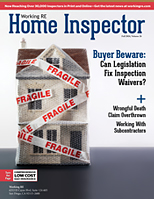 | > E&O/GL Insurance for Home Inspectors Competitive Rates, Broad Coverage, Free Risk Management, online inspection support for tough questions, discounts on education and more… Professional Coverage, Competitive Pricing Shop OREP today! |
Buyer Beware: Can Legislation Fix Inspection Waivers?
by Tony Jones, Senior Editor
The waiving of the home inspection has long been selectively used in real estate purchase transactions, but the popularity of buyers purchasing their homes without any home inspection contingency went into overdrive during the COVID-19 pandemic. As home sales soared, home inspectors rode the wave of transaction volume—but still lost out on a massive segment of business due to inspection waivers.
Here’s some data to put it in perspective. The National Association of Home Builders reports that new and existing home sales in 2020 and 2021 totaled 6.45 million and 6.9 million transactions, respectively.
Meanwhile, alongside this transaction boom, buyers are believed to have waived their home inspection contingencies on 19 percent to 30 percent of all purchase transactions during those years, based on surveys published by the National Association of Realtors (NAR). If we assume that an average of 24 percent of home inspections were waived on these transactions and an average inspection fee of $450, it translates to a staggering $700 million and $750 million in lost home inspection revenue in those respective years.
Here’s what that means for the individual home inspector. If we consider that there are roughly 25,000 home inspection firms in the United States today, this represents an annual loss of revenue per firm of $30,000. For smaller operators, that number could equate to a third or more of their annual income.
What many home inspectors may not realize is that inspection contingencies are continuing to get waived en masse, even today. In 2024, depending on the month, anywhere from 19 percent to 25 percent of buyers are still waiving their inspection contingency, according to the first six Realtors Confidence Index Surveys published by NAR this year.
Those figures help support the contention made by many home inspectors that waiving the inspection contingency has been adopted as common practice, particularly in instances that have multiple buyers vying for the same property. In those cases, buyers often find themselves in bidding wars, feeling obligated or coerced to dispense of their primary pre-purchase opportunity to learn what may be wrong with the property they’re about to buy.
Thankfully, the estimates of lost revenue above may be overstated because some buyers do decide to hire home inspectors for post-sale inspections. While that’s good news for home inspectors, it has sometimes revealed disastrous results for buyers, with local and national news outlets sharing stories of homebuyers who unwittingly purchased homes that required six-figure repairs (and regret waiving their initial inspections).
This raises the question: Can anything be done to protect homebuyers and curtail the competitive pressures that continue to drive many buyers to waive their home inspection on what is oftentimes the biggest investment of their lives? Should anything be done?
Some home inspectors think so. In Massachusetts and New York, two state home inspector associations decided to do something about it. Both successfully managed to get bills introduced into their state legislatures that would guarantee buyers the right to a home inspection. Neither bill makes a home inspection mandatory, but both guarantee the option.
In August, Massachusetts home inspectors scored a major victory when key provisions of their bill were signed into law as part of the Affordable Homes Act. Specifically, this new consumer protection makes it illegal for sellers or real estate agents to condition the acceptance of an offer to purchase a home based on a buyer’s “agreement to waive, limit, restrict or otherwise forego” their right to an inspection. It also makes it illegal to accept an offer based on direct or indirect advanced knowledge that the prospective buyer intends to waive their right to an inspection.
Though final regulatory details of this landmark legislation must still be determined, it could serve as the blueprint for home inspectors and industry stakeholders across the United States who have an interest in passing similar measures. What follows are the details.
(story continues below)
(story continues)
A Wave of Waivers
The state bills are essentially byproducts of the seller’s markets that emerged coming out of the pandemic. At the height of the frenzy, some home inspectors estimated that 80 percent of home sales were closing without a home inspection in their area, recalls Jameson Malgeri, president of the New England chapter of the American Society of Home Inspectors Inc. (ASHI) and owner of Another Level Inspection LLC in Gloucester, Massachusetts.
“Everyone that was waiving their inspections was essentially under a lot of pressure, striking out a lot of times trying to get a property,” says Malgeri. “Eventually, even if they started off with the intention of having an inspection, a lot of buyers ended up getting pushed to the point where they felt they were never going to get a property unless they waived.”
Like a boulder rolling downhill, that stance picked up momentum and became prevalent in many local markets. Malgeri and other inspectors wound up performing more post-sale inspections than usual, and heard buyers’ frustrations first-hand. “What I kept hearing from my clients was, ‘I was forced to do this. I really would have liked to get an inspection,'” notes Malgeri. “It’s almost like they were embarrassed or upset that they were forced into this position.”
Occasionally, those home inspections revealed big-ticket problems or unsafe conditions that might have ended the sale or at least deterred buyers from pursuing their purchase without additional negotiations. Collectively, several Massachusetts home inspectors who are members of ASHI New England came to believe they were “uniquely situated to see the negative results of waiving an inspection,” explains Malgeri, and decided to start writing a bill that would better protect consumers.
Eventually, attorney Tad Heuer, a partner at Foley Hoag LLP, was enlisted to draft a workable bill, and state Rep. Brian Ashe signed on to sponsor the bill in the House, while state Sen. Michael Moore brought it to the Senate.
New York State of Mind
Around the same time, the real estate market in New York faced similar challenges, including an influx of buyers who initially waived their home inspection contingency only to eventually obtain an inspection after their transaction had closed.
“Even in today’s market, if a real estate buyer puts in an offer with a contingency, it’s going to go in the bad stack,” says Henrey Jetty, president of the New York State Association of Home Inspectors (NYSAHI) and owner of Veterans Home Inspection Services LLC in Rochester, New York. “The seller will only accept offers that have no contingencies. Our contention with that is the whole reason for New York state licensing home inspectors was to ensure that due diligence was done on every real estate transaction, so that the buyer knew what they were getting into as far as the condition of the home.
“Home inspectors in New York and across the country do a lot of post-sale inspections now. I’ve had people start crying during the inspection when I start pointing out all the numerous things that are wrong with their home that they weren’t aware of,” notes Jetty. “We’ve had numerous examples of buried oil tanks, cracked foundations, mold in the attic, bad roofs—the real show stoppers in a real estate transaction. People have bought their homes and then later found out that they’ve got $20,000 to $50,000 worth of repairs. And some of these people have found out that their house is uninsurable.”
Similarly frustrated by the changing market, NYSAHI had been actively monitoring for home inspection legislation nationwide, when it learned of the pending Massachusetts bill. It wound up using a first-generation version as a template for its own bill, which was introduced into the 2023-24 legislative session of the New York Assembly by Rep. Monica P. Wallace, with an assist from the Western New York Alliance of Home Inspectors.
(story continues below)
(story continues)
Key Provisions
As introduced, the bills were almost identical and set forth to ensure homebuyers have the option to exercise their right to a home inspection within 10 days of an offer being accepted. Again, the hearts of the measures were designed to effectively bar sellers from having advanced knowledge of a contingency waiver or using it as a selection tool when evaluating offers. Exceptions exist for properties under auction as well as those sold to a family member.
The strike down of having or sharing advanced knowledge of an intent to waive a home inspection would essentially change the standard purchase offer in both states, in which prospective buyers can currently indicate their wish for a home inspection if their offer is accepted or signify their intent to forego an inspection. As written, sellers and their real estate agents wouldn’t (or shouldn’t) know ahead of accepting or refusing an offer whether a buyer intends to pursue a home inspection.
The original language in both bills would allow buyers to terminate their offer if they aren’t satisfied with the results of the home inspection, and both expressly state that “nothing … shall be construed to require, mandate or otherwise compel a prospective purchaser to obtain an inspection following the acceptance by the seller of an offer to purchase.” In addition, the bills included a civil penalty that would fine sellers in violation of a buyer’s right to home inspection 4 percent of the home sale price or $10,000, whichever is greater.
Bill Passed
The passage of the Massachusetts measure means it will now be illegal for a seller to discriminate offers based on inspection contingencies. However, the final regulatory aspects of the law will be determined by the Executive Office of Housing and Livable Communities.
The language included in the Affordable Homes Act was a distilled version that left the key intent for a buyer’s guarantee to a home inspection intact. It was attached as one of several amendments to the $5.16 billion housing bond bill (H 4977) at the 11th hour as formal legislative sessions drew to a close. Ultimately, the bond bill passed the House 128-24 and Senate 37-2. Gov. Maura Healey signed it into law on Aug. 6.
New York Limbo
Meanwhile in New York, Assembly Bill 8889 remained in Committee Assembly after it was introduced on Jan. 26 and did not garner legislative sponsorship outside of Wallace. NYSAHI intends to seek Wallace’s support to reintroduce the bill when the State Assembly reconvenes early next year. In the meantime, the association is running a grassroots effort to educate the public about the value of securing the right to a home inspection as well as drum up additional support from lawmakers.
“Going into negotiations, we put a lot of loophole closures into the bill, knowing that it was going to be massaged and that other associations may have a word into the bill if it has a chance to pass,” explains Jetty. “We’re fighting to get it passed, but some things will come into the bill, and some things will go out.”
Influence from opposing groups could also play a factor in changing or killing the measure, as the bill faces opposition from the New York State Association of Realtors (NYSAR). In a “Memorandum in Opposition” written in March, NYSAR argues the New York bill has “unnecessary restrictions” that are “technically flawed and in search of a problem that does not exist.” It also claims the “bill has the potential to harm middle-class homebuyers with less capital and liquidity by limiting a potential competitive advantage in a tight housing market.”
NYSAR’s reasoning for the latter is the proposed 10-day due-diligence window, which the group argues would delay the transaction and potentially allow higher-priced offers to swoop in. In slower markets, NYSAR contends the 10-day period could harm sellers by holding up other potential offers and propel prospective buyers to move on. The group also maintains home inspections will increase as a result of the bill and likely result in price increases for inspections due to higher demand.
Disadvantaged Groups
Though market conditions that result in buyers waiving a home inspection contingency are generally more favorable today than during the height of the seller’s markets that helped motivate the New England and New York associations to push for their respective right to home inspection bills, Malgeri and Jetty insist that prevalent factors still exist that make foregoing an inspection dangerous for buyers.
In New York, for example, Jetty says sellers often indicate “unknown” straight down the line on property-condition disclosure forms, which could raise their liability in a sale once an existing problem is discovered and unnecessarily places buyers in harm’s way if they elect not to pursue an inspection.
In both states, buyers waiving home inspections remains commonplace, both inspectors say, whether pressured by a real estate agent, used voluntarily as a tactic to make an offer more favorable, or even as a way to save money. Cost-savings also tends to be a driver for buyers who opt for a cursory walk-through or walk-and-talk, which is much smaller in scope than a typical home inspection, often doesn’t include a written report, and may be conducted by a non-licensed provider. Malgeri and Jetty both condemn walk-throughs as a violation of accepted standards of practice for home inspectors as well as state requirements, and refuse to do them.
They also believe these conditions disproportionately impact buyers competing to purchase average- and lower-priced homes. “I would say houses in the lowest income brackets are the ones that are definitely being hit the most because those are also the people that don’t have $100,000 to fix a problem that comes up during an inspection,” says Malgeri. “That’s potentially going to completely change their buying decision.
“A lot of times these are the buyers I’m doing the inspection for after a sale and delivering bad news because the people selling those homes also often have trouble keeping up with the maintenance of the house, and that’s why they’re selling to begin with,” he continues. “So, it’s an unfortunate situation for the people who are probably in the worst financial situation.”
National Template?
One of the arguments opponents make against the right to home inspection bills is that they’re unnecessary because buyers already have the opportunity to request a home inspection contingency when making an offer to purchase. But Malgeri argues that asking for a home inspection contingency is distinctly different than being guaranteed the right to execute one if an offer is accepted.
Despite their pursuit of legislation, ASHI New England and NYSAHI are adamant they don’t want home inspections to be mandatory because of the risks for commoditization, dilution of services and over standardization of reports and procedures. Ultimately, while they acknowledge these measures will benefit home inspector businesses, they also believe guaranteeing the right to home inspection will help reduce liability for all parties in home-sale transactions, and reduce financial hardship and avoidable health risks for buyers.
“It’s possible sellers might lose a little bit of rights, but realistically it’s not a big change,” notes Malgeri. “It’s really going back to pre-pandemic conditions. The advantage to doing that through legislation is we’re really going to keep more buyers and their families safe. To me, there’s no question it’s worth it.”
With one measure now on the law books, Malgeri and Jetty believe the right to home inspection bills could serve as templates in other states.
“I think there’s definitely potential for it to be accepted in many areas across the nation,” says Malgeri. “I could see it becoming a standard nationwide.”
“Home inspectors that I’ve talked to in other associations across the United States are all for this. They’re very interested in it,” agrees Jetty. “I think it’s going to be a domino effect once one gets passed. Neighboring states are going to take a look at this and say, ‘We need to protect consumers with the largest purchase of their lives and allow them to do due diligence on a home.'”
About the Author
Tony Jones is Senior Editor of Working RE magazine, published by OREP, a leading provider of E&O insurance for real estate professionals. Based in San Jose, California, he has nearly 30 years of business publishing experience and graduated with a bachelor’s degree in journalism from the University of Arizona. To reach him, email tony@orep.org.

OREP Insurance Services, LLC. Calif. License #0K99465




by Larry E. Arnett
I recommend a home inspection in every appraisal report I do. I make it clear that I’m not a licensed home inspector even though I have about a thousand hours of inspector education. I also make it clear that I’m not allowed by the State of Texas to make definitive statements about needed repairs or whether any repairs were done correctly or meet code. I point out what’s obvious to me. If I see a potential problem, it’s usually worse than what I can see so I don’t hesitate to point issues out and strongly recommend a home inspection. I also make it clear that, regardless of accepting a property “as is” in the contract, that such has nothing to do with the appraisal and my fiduciary obligation to the public trust. But, as we all know, the powers that be are doing everything they can to put the appraisers, inspectors, surveyors and title companies out of business.
-